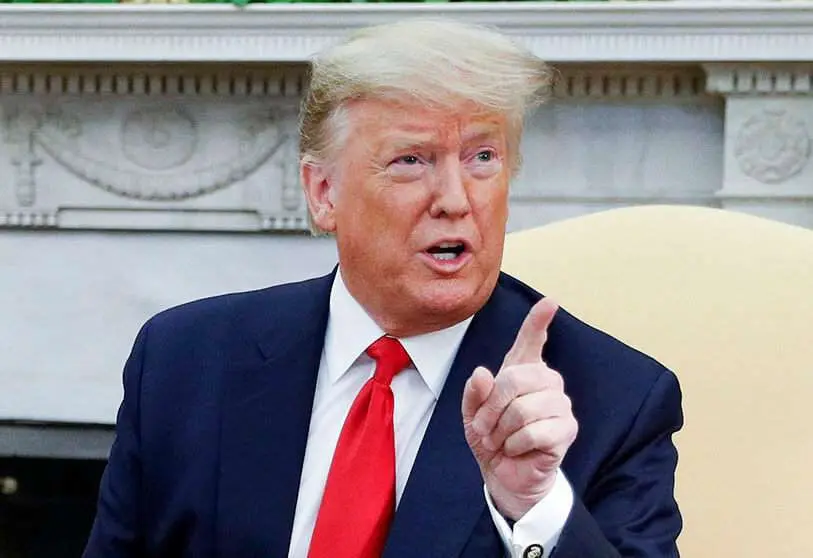Trump, one-term president?

The citizens of the United States elect a president every four years, but it is not incorrect to say that once they set foot in the White House there is a high probability that they will regain their mandate. Since the end of World War II, only three incumbents have failed to win a presidential election: Gerald Ford in 1976, Jimmy Carter in 1980, and George H. Bush in 1992.
The first of them reached the maximum power after the resignation of Richard Nixon, surrounded by the 'Watergate' scandal. Against much public opinion, Ford exonerated his predecessor, which sank both his popularity and his political future. Carter, his successor, faced a severe economic crisis, which led voters to choose Ronald Reagan, his Republican opponent. The economy was also instrumental in the defeat of Bush, unable to curb the rising unemployment rate that the country was facing. Thus, it could be said that the main impediment to a president being elected again - Ford never won an election - is essentially economic.
During the first three years of the Trump Administration, the economy has played in his favor, in part thanks to the strength inherited from President Obama. The magnate was able to take advantage of the positive trend and maintained the reduction in the unemployment rate, which fell to 3.5% in March 2020. With regard to GDP, it has always remained above the 2% threshold during his presidency, reaching 2.3% in 2019. However, income inequality is the highest in 50 years and, according to the Census Bureau, the country has a Gini coefficient - a measure of the social gap - of 0.485, higher than countries such as Iran or Argentina. Moreover, GDP growth has been the lowest in its entire mandate, falling short of 2.9% in 2018.
In addition, the threat of a recession was already beginning to loom over the U.S. economy before the coronavirus pandemic. According to the 'World Economic Outlook' of January 2020 published by the World Economic Forum, the United States would reduce its growth to 2% in 2020 and would accuse this trend in 2021, with an increase limited to 1.7%. Trump based part of his electoral success on his management credentials, which would allow him to govern the country with an entrepreneurial mindset, so an economic slowdown would seriously affect his electoral prospects. In addition, his largest voter base is white men without a college degree - 71% chose him in 2016 according to a CNN poll - a group at serious risk in the event of a recession.
Far from remaining a future challenge, the coronavirus has precipitated events, plunging American society into a historic crisis. In just three weeks, the virus has left more than 16 million people unemployed, an unprecedented situation with important consequences for a faction of the 'Trumpista' base: the working class. A clear example is the case of General Motors, Ford and Fiat Chrysler. The three manufacturers based in Michigan suspended car production to protect their workers, but the prolongation of this closure would put their jobs at serious risk. Since Trump beat Clinton in the state by only 0.23%, a small demobilization of this group could make him lose the 16 electoral votes granted by the Great Lakes State.
The economy is not the only challenge the president will face. Joe Biden, the Democratic candidate, is a priori more attractive than Hillary Clinton, the president of this party in the last elections. It is true that both Biden and Clinton belong to the much-denounced 'establishment', but there are notable differences between the two, like their own gender. In the Michigan primary in 2016, for example, Sanders won 55% of the male vote according to a CNN poll, while this support fell to 41% in 2020. The sexism that Clinton faced was therefore a major impediment to attracting the male electorate that, in fact, ended up favoring Trump. The president's closest base, white workers without higher education, also abandoned Sanders in Michigan, and their support among the collective grew from 57% in 2016 to 40% in 2020, according to CNN.
The shortest of primaries will also serve to strengthen Biden's leadership in the run-up to the November 3 election. In 2016, Sanders and Clinton engaged in a fierce battle that lasted until the Democratic Convention, even though the number of delegates did not accompany Sanders. This year, his early exit from the race may help the party heal old wounds and cement a broad coalition to bring the Democrats back into the White House. The polls are tracking Biden so far, and according to RealClearPolitics, he is ahead of Trump in key regions such as Florida, Wisconsin and Pennsylvania, but it is still early to determine the strength of those polls.
Ultimately, Trump's re-election may be reduced to two factors beyond his control: the economic ravages of the coronavirus and the effectiveness of Biden, whose greatest limitation throughout the primary process has been himself. Nevertheless, a correct management of the pandemic, which at least exceeds current -scarce- expectations, as well as a campaign that exploits Biden's weaknesses, may be key to his political future. A crisis never helps a president in an election year, but Trump has turned out to be at least an atypical leader who has broken any pre-existing framework of analysis. The coronavirus, on the other hand, has also proved to be an unprecedented challenge for humanity, which has seen its future reduced to flattening a macabre curve of contagion and death.
Can a single president overcome exceptional circumstances? The next few weeks will be decisive in determining whether Trump finally becomes a historical anecdote or whether, on the contrary, he entrenches his legacy in the stagnant American political elite.
